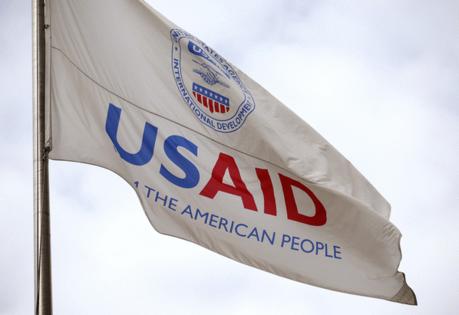Trump notifies Congress of plan to rescind billions in foreign aid
Published in News & Features
WASHINGTON — President Donald Trump asked Congress to claw back nearly $5 billion in already-approved foreign aid spending, a proposal timed to take advantage of the looming end of the fiscal year and allowing him to cut the funding himself if lawmakers fail to act by the close of September.
The maneuver challenges Congress’ spending powers and intensifies an already contentious battle over government funding, which is due to lapse Sept. 30. Democrats are sure to seek guarantees Trump will actually spend money lawmakers appropriate in exchange for their votes to keep the government open.
The proposed cuts include $3.2 billion in U.S. Agency for International Development assistance, $322 million from the USAID-State Department Democracy Fund, $521 million in State Department contributions to international organizations, $393 million in State Department contributions to peacekeeping activities and $445 million in separately budgeted peacekeeping aid, according to an administration official who described the notification on the condition of anonymity.
Trump notified lawmakers of the plan in a message triggering a law allowing him to freeze the funds while waiting for Congress to act. The effort was first reported by the New York Post.
The maneuver, which White House budget director Russ Vought calls a “pocket rescission,” is a little-tested tactic that, if successful, could tip the balance of spending powers in the federal government.
The fight has already divided Trump’s own party — particularly in the Senate, where Republicans Mike Rounds of South Dakota and Susan Collins of Maine worry that it could upset a time-honored understanding of which branch has the power of the purse.
“Any effort to rescind appropriated funds without congressional approval is a clear violation of the law,” Collins, who chairs the Senate Appropriations Committee, said in a statement Friday.
Senate Minority Leader Chuck Schumer said the move “is further proof President Trump and Congressional Republicans are hellbent on rejecting bipartisanship and ‘going it alone’ this fall.”
“If Republicans are insistent on going it alone, Democrats won’t be party to their destruction,” Schumer said in a statement.
By taking advantage of a gray area in a 1974 law requiring the president to spend money appropriated by Congress, the White House hopes to use the calendar to its advantage. The Impoundment Control Act allows the president to temporarily hold spending for 45 days while Congress considers the proposal to rescind it. Such rescissions used to be common, and Trump revived the practice by getting Congress to cancel $9 billion in spending on public broadcasting, foreign aid and global health programs in July.
But if the request comes in the final weeks of the fiscal year, Vought argues, the money could expire before the clock runs out — effectively making the cuts permanent. Vought likens the tactic to a “pocket veto,” where a president lets a bill die without signing it when Congress is out of session. He floated the idea in the closing days of Trump’s first term, and revived it this year as deficits mount and the White House looks for ways to slash spending without waiting for appropriators.
Critics say the approach risks crossing a legal line. The Government Accountability Office has warned that end-of-year timing maneuvers violate the spirit of the law, though GAO’s opinions aren’t binding and the agency once condoned a similar move by President Gerald Ford in 1976. Constitutional scholars note that a pocket rescission would amount to a line-item veto, letting the president decide which parts of spending bills to honor — a power the Supreme Court struck down in 1998.
_____
With assistance from Steven T. Dennis.
_____
©2025 Bloomberg L.P. Visit bloomberg.com. Distributed by Tribune Content Agency, LLC.







Comments